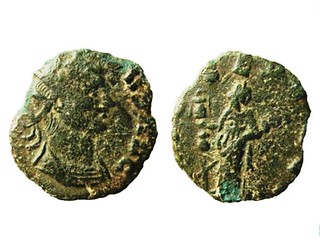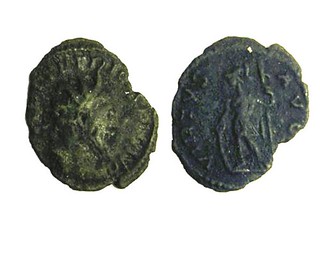
PREV ARTICLE
NEXT ARTICLE
FULL ISSUE
PREV FULL ISSUE
ROMAN BARBAROUS RADIATESHere's an article about contemporary copies of small roman bronze coins - the barbarous radiates. -Editor
These copies of small bronze coins of emperors such as Victorinus and Tetricus II were made in the period 270 to 286 AD and form an accepted but irregular coinage used throughout Roman England. Many of the copied coins – from single finds to hoards have been recorded with the help of metal detectorists on the national database of the Portable Antiquities Scheme. It gives details of Cumbrian finds from places including Barrow, Dalton, Grange, Kendal and Maryport. How they were made and used was explorer by Norfolk county numismatist Dr Adrian Marsden in a talk at Harrogate to the spring conference of the British Association of Numismatic Societies. He said: "It is best to see them as a supplementary coinage."
He said: "The gold pretty much disappears. It is squirrelled away and hoarded as bullion." Copies of official Roman coins could be cast in moulds or struck on metal blanks using a hammer and a pair of engraved dies. Coin moulds had been discovered at Lincoln and Lancaster - anything made from them would have a seam at the edge where the two halves of the mould met and would be under normal size as molten metal shrinks as it cools. By 270 official coins had no more than two per cent silver cotent with the rest of the metal being a copper alloy. An estimated 50 per cent of the coins in general circulation were fake. He said: "Some are very competant copies, others are shocking." To read the complete article, see:
Wayne Homren, Editor The Numismatic Bibliomania Society is a non-profit organization promoting numismatic literature. See our web site at coinbooks.org. To submit items for publication in The E-Sylum, write to the Editor at this address: whomren@gmail.com To subscribe go to: https://my.binhost.com/lists/listinfo/esylum All Rights Reserved. NBS Home Page Contact the NBS webmaster 
|

